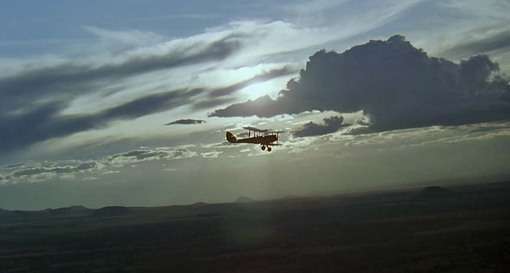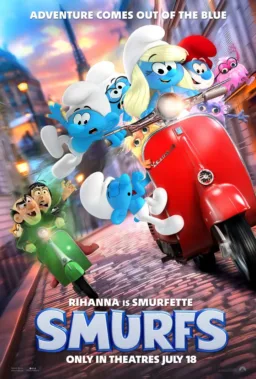The other night I had dinner with some longtime film critic friends (mmmmmm, homemade Rogan Gosht!) and we got to talking (and laughing) about the dumb things you overhear people say in movie theaters — whether at critics’ screenings or multiplexes. The funniest kind are those intended to convey some kind of filmmaking savvy or insight but that actually reveal ignorance by saying nothing at all. It’s inexcusable when critics use these buzzwords, and it’s just as embarrassing when affected “laypersons” (“civilians”? “Regular Joes”?) use it, even as inane small-talk. [Clarification: It’s not just empty-headed, it’s the very definition of pretentious.]
In the 1970s and 1980s you always heard people compliment “the beautiful cinematography,” but not so much anymore. (I don’t know if this had anything to do with David Watkin’s magnificent 1986 Oscar speech for “Out of Africa,” but I’d like to think so.) It was the kind of thing someone could substitute for not saying anything at all: “Well, I noticed something about the movie: some of the pictures were pretty!”
Now it’s “well-shot,” which means absolutely nothing — or, rather, could mean absolutely anything — except, maybe, “not well-shot.” It’s almost the same as clichéd small talk about the weather: “Nice day,” “Hot enough for you?,” “It’s not the heat it’s the humidity”… Actually, no, those things have more meaning than “well-shot.” Anyway, it’s one of those things lazy critics habitually throw into the final paragraph of their reviews, which Richard T. Jameson (of Straight Shooting and other venues) has summarized as: “There was also photography and music.” A local semi-reviewer recently invoked the phrase with regard to the shaky-cam work in “The Hunger Games.” He didn’t like the movie… “but it was well-shot.” Which means… what? The focus-puller was doing his job? What, exactly, was “well” about the way it was shot?
RTJ has also proposed that “well-shot” deserves its own “Mystery Men“-type superhero: “I am The Shooter. I shoot well.”
One of my critical companions reported another overheard, all-purpose numbskull observation made by an exiting moviegoer (I don’t remember what film they’d just seen — “Prometheus,” maybe?): “Hmmm. Needs editing.” Yeah. Needs gaffing, too. OK we know people think that they’re saying they wish the movie had been shorter (though “It could lose about half an hour,” is almost as vague and obnoxious), but I can’t think of another context in which the term “editing” is misused to mean, simply, “truncating.” I wish these people would simply own their boredom: They mean to say they got impatient with the movie. Whenever I hear “needs editing,” I’m tempted to say: “Really? Where?” But, really, where would that get me, besides maybe injured or dead? (Also, if you’ve ever seen the original Ladd Company release of “Once Upon a Time in America,” you’ll know that the 139-minute version is infinitely longer than Sergio Leone’s 229-minute cut. A 245-minute cut, reportedly the closest to Leone’s original version, screened recently at Cannes. It may prove to be the shortest yet. All it needed was editing.)
Anyway, it became a running gag (and it’s still running). After a devastating episode of “Mad Men,” a friend poured his heart into an e-mail and then concluded: “But it was well-shot.”
My goal for this post is to help the terms “well-shot” and “needs editing” go viral. Yes — you, too, can talk just like a lousy film critic! See how many ways you can use them. When standing in line at the grocery store, perhaps: “Needs editing.” Or when looking at a sunset: “Well shot!” Go ahead. Try it. And tell your friends…
ADDENDUM (06/12/12): After spending so much time responding to comments below, I’m embarrassed to realize that I should have understood why I felt I was arguing a position I don’t hold. Some have sidestepped my assertion that “well-shot” and “needs editing” are meaningless small-talk by focusing on whether it’s unreasonable to expect people not to engage in small-talk. But, re-reading my first paragraph, I find that I addressed that pretty clearly: “The funniest kind are those intended to convey some kind of filmmaking savvy or insight but that actually reveal ignorance by saying nothing at all. It’s inexcusable when critics use these buzzwords, and it’s just as embarrassing when affected “laypersons” (“civilians”? “Regular Joes”?) use it, even as inane small-talk.” So, unless the meaningless small-talk is “intended to convey some kind of filmmaking savvy or insight,” then it’s not the kind I’m talking about. OK?
ADDENDUM (06/26/12): Just discovered this, in Roger Ebert’s review of “Visions of Light” (1993):
It is commonplace to observe that a film has good cinematography, but far less common to discuss what is meant by that.
Sometimes all it means is that the pictures are pretty, and for many people, I think, “cinematography” somehow connects with vast outdoor vistas — the sand dunes in “Lawrence of Arabia,” or the Texas plains in “Days of Heaven.” But great cinematography can also consist of the look in an eye, the tense space between two people, or the shadows in the corner of a cramped room….











